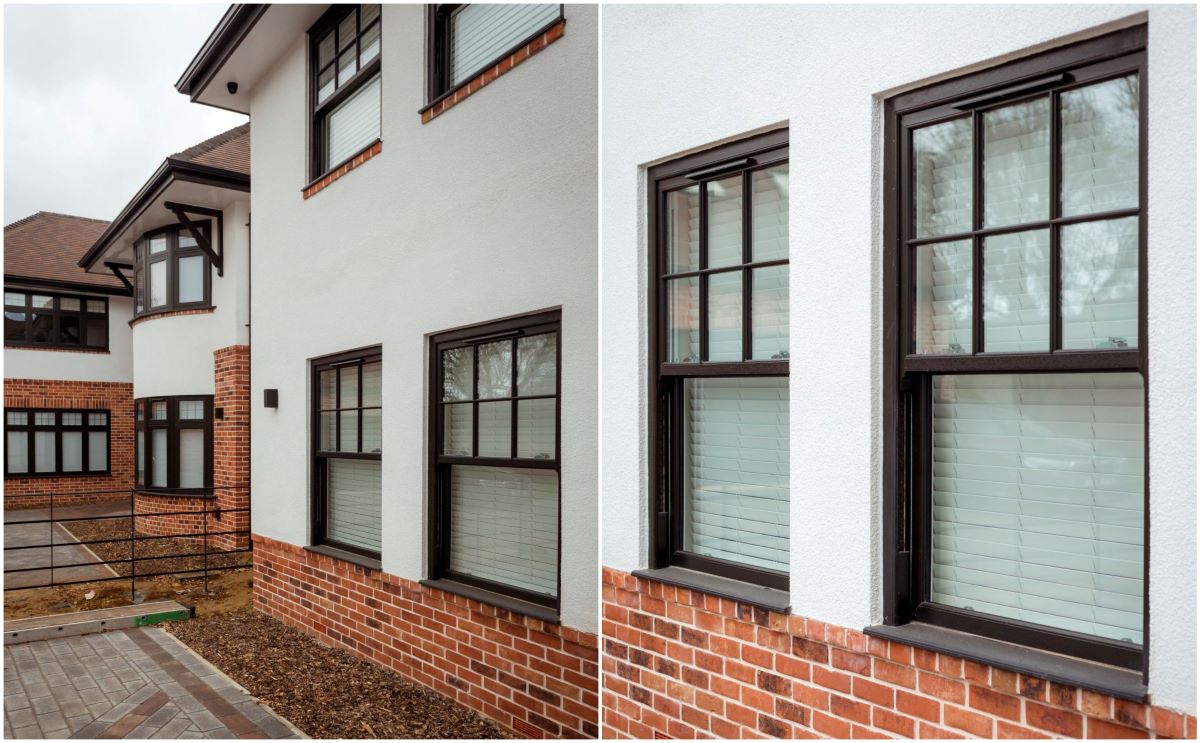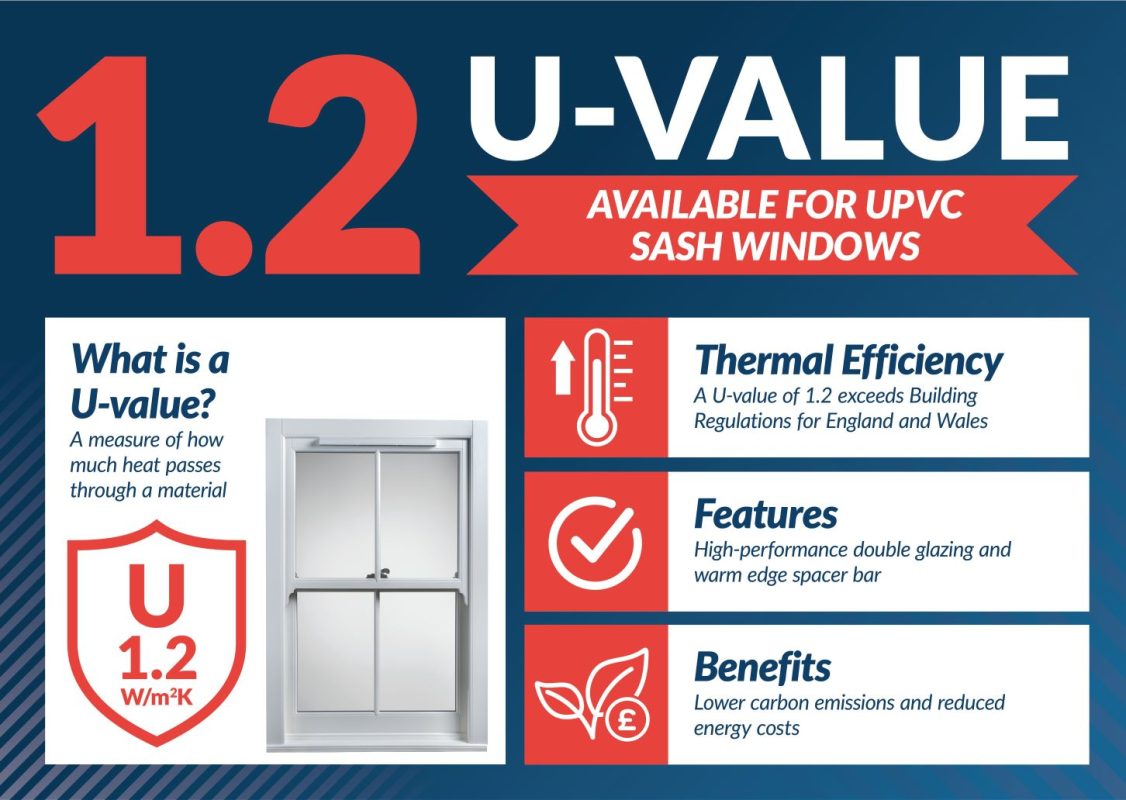1.2 U-Value Available Now For uPVC Sash Windows
Share this story!
Share this post to any popular social media, email it to a friend or print it off.
What is a U-value?
A U-value refers to the measurement of thermal transmittance or heat loss. Specifically, it quantifies how effective a material is as an insulator. For windows, the U-value is an essential metric for assessing energy efficiency. It represents the rate of heat transfer through a window due to the temperature difference between the indoors and outdoors. A lower U-value indicates better insulation, meaning less heat is lost through the window.
U-values are measured in Watts per metre squared Kelvin (W/m²K). Windows with a lower U-value are more efficient at retaining heat, which can lead to reduced heating costs and improved comfort indoors. When selecting windows, we’d recommend choosing ones with a low U-value to improve energy efficiency, heat retention, and consequently your energy bills.

Is a higher or lower U-value better?
A lower U-value means that the window has better insulation properties. It indicates that the window is more effective at reducing heat transfer between the inside and outside of a building.
Windows with lower U-values are more energy-efficient because they help to retain heat inside during cold weather and reduce the need for heating. This can lead to lower energy bills and increased comfort indoors.
When selecting windows for energy efficiency, look for those with the lowest U-value possible within your budget and other requirements. Modern energy-efficient windows often have U-values well below older windows, helping to significantly reduce heat loss. Quickslide offer 1.2 U-value sash windows, as well as wide range of 1.2 U-value windows and doors or lower. For some of our range, like uPVC casement windows and uPVC sliding patio doors, we can even reach an incredible 1.0 U-value with triple glazing!

What is the U-value required for sash windows?
A lot of our customers often ask: is 1.2 a good U-value for windows? Our answer? Yes!
In new build homes, the target U-value for windows is set at 1.2 W/m²K. This benchmark is aimed at enhancing thermal efficiency and reducing heat loss, thereby contributing to overall energy savings and improved indoor comfort. A U-value of 1.2 W/m²K signifies superior insulation performance, ensuring minimal heat transfer through the window.
However, the limiting U-value for windows in new builds is set at 1.6 W/m²K. This limit ensures that all new windows, even those not reaching the optimal target of 1.2 still provide a significant level of insulation to support energy efficiency standards and environmental sustainability in modern housing.
Wondering what the required U-value for your windows is? You’re in luck! We’ve created a U-value calculator, so all you need to do is input your project details to find out the recommended U-values or energy ratings for your windows. It’s important to bear in mind that you shouldn’t replace old windows or doors with new ones if the new U-value will be worse than the original.
Why are U-values important?
- Indicator of Insulation Efficiency
- Enhanced Energy Efficiency
- Environmental Impact
- Compliance with Regulations
- Cost Savings
- Sustainable Building Practices
- Comfortable Indoor Environments
Homeowners often ask us why U-values are important, and in truth it’s fairly straightforward.
U-values are so important because they measure the thermal performance of building materials, indicating how well a window, door and/or other building material conducts heat. A lower U-value means better insulation, reducing heat loss and improving energy efficiency in buildings. This is crucial for maintaining comfortable indoor temperatures, reducing heating and cooling costs, and minimising environmental impact.
By understanding U-values, our trade partners can make informed decisions about materials and construction methods, leading to more sustainable and cost-effective building designs. It’s essential to comply with building regulations and performance standards, so achieving the correct U-values isn’t just helpful for lower energy bills, it’s a legal requirement.

Quickslide’s new 1.2 U-value for sash windows
Our windows will be some of the most energy efficient sash windows on the market! We’ve just launched an upgrade to our uPVC sliding sash windows that will achieve an incredible 1.2 W/m²K, and we’re excited to be leading the way in energy efficient sash window design.
To achieve a U-value of 1.2 for our sash windows, we are implementing several key upgrades.
- We’re replacing some of the steel reinforcement in the sashes with RCM (Plastic Reinforcement). This substitution improves the thermal performance as plastic is a better insulator than steel, reducing heat transfer.
- We’re also inserting additional insulating materials into some of the chambers in the frame and cill. The material’s excellent insulating properties help reduce heat loss through the otherwise air pockets.
- Finally, we’re upgrading the coating on the glass unit. The upgraded unit offers superior thermal insulation by reflecting more heat back into the room, therefore enhancing the overall energy efficiency.
These combined measures will significantly improve the thermal performance of our sash windows, ensuring they meet the desired U-value of 1.2.
Want 1.2 U-value sash windows for your next project?

You May Also Be Interested In:
- What is a Single Hung Sash Window?
- What is a Horn on a Sash Window?
- Energy Efficient uPVC Sash Windows
- Replacement Sliding Sash Windows
- Slim Midrail for uPVC Sash Windows – Coming March 2024!
Please note, our news articles are relevant and accurate at the time of release, but as technical developments dictate, and times goes by the information in this article may no longer be applicable. If you have questions, please contact us using our online contact form or call us on 03332 412 240.



